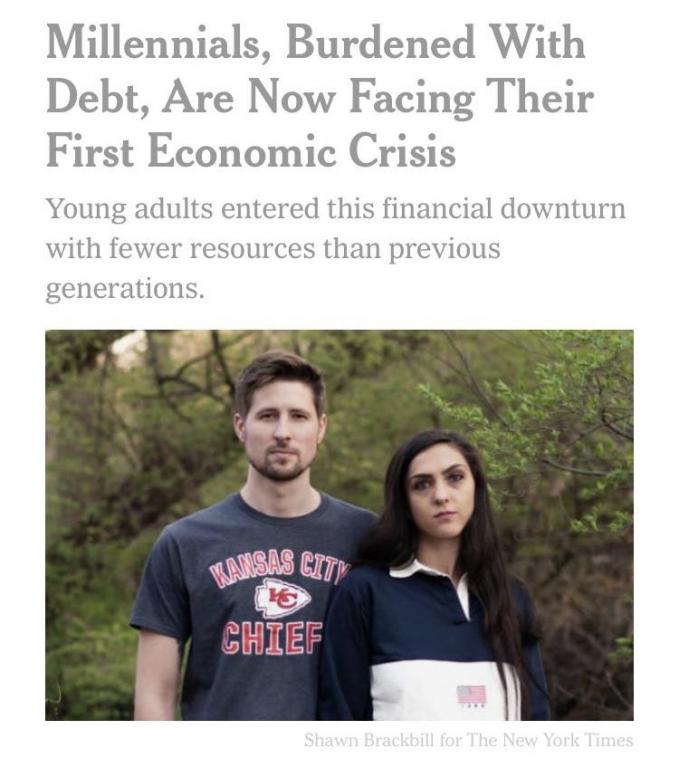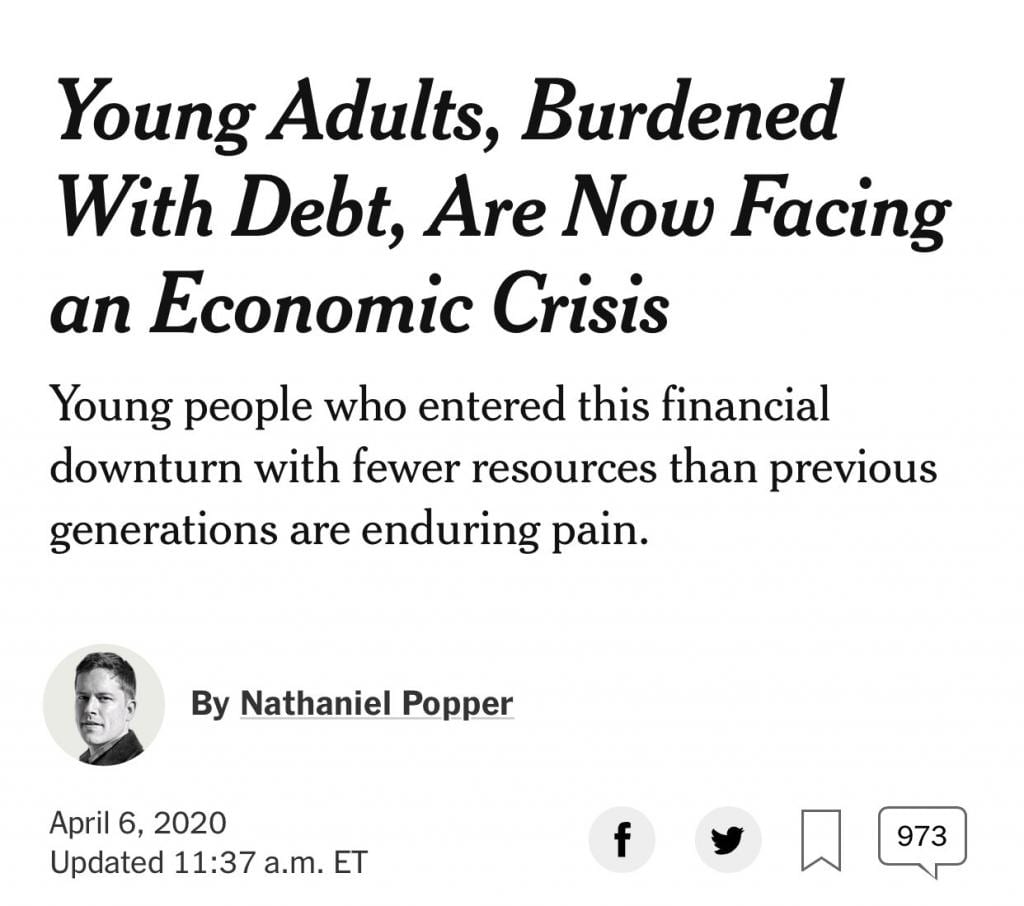Why is the media still using “Millennials” as shorthand for college kids? Words have meanings, and this ain’t it. Remember all the talk about the “Millennials” on the beaches in Florida during spring break last month?

There is some disagreement on what years bracket the Millennial generation. While the most commonly accepted dates are 1980 and 1996, some use 1982 to 2000. Personally, I’m preferential to the former age range. But even if you use the later age range, college students today are a mixture of Millennials and Gen Z.
But I want to discuss something slightly different—something more related to the Millennial experience than to any specific age range. It’s a recent NYT piece by Nathaniel Popper, which ran under the following headline: 
“Millennials, burdened with debt, are now facing their first economic crisis,” the headline declares. Here’s the thing, though. That’s not true. I’m a middling Millennial, and this is not our first economic crisis. The 2008 financial crisis hit my peers and I hard. We left college into a world where there were no jobs. Many of us went to grad school to delay hitting the job market. Others of us struggled to find work. Older Millennials saw their careers derailed.
Hearing about the stock market and concerns about recession these past months has evoked a sense of underlying terror in me, because I remember 2008 and I don’t want to go back there. First economic crisis my foot!
Yes, younger Millennials had a different experience. But even Millennials currently in their mid-twenties graduated into an economy whose looks were deceptive. While the stock market went up, up, and up, many younger Millennials found themselves saddled with college debt and stuck in a gig economy.
Popper doesn’t address any of this, which is odd, given that his focus is on how much less wealth Millennials have now than Gen Xers had in 2008:
Going into the financial crisis of 2008, Generation X was roughly the same age as millennials today, but had on average twice the total assets that millennials have now when all bank accounts, stocks and loans are added together, according to an analysis done for The New York Times by economists at the St. Louis Federal Reserve.
This is absolutely true: Millennials today have far less wealth than previous generations at their same age. Bafflingly, Popper doesn’t discuss the reasons Millennials have so much more debt and so many fewer assets—reasons that have a lot to do with 2008. It’s not just college debt—it’s also that many of us graduated into one of the worst job markets in generations, an economy that proved to be permanently changed even as the stock market recovered and then rocketed past prior highs. The closest Popper comes to addressing this is noting that many Millennials today are involved in the gig economy, which is particularly vulnerable to disruption, but he never addresses why.
Popper’s assumption that this is Millennials’ first economic crisis seems to have warped his ability to address or effectively analyze why Millennials have fewer assets than previous generations have at the onset of a recession like the one that’s looming. One big reason for that is that this is not our first economic crisis.
Popper’s only reference to the 2008 financial crisis’ impact on Millennials is as follows:
The 2008 crisis made young Americans then more reluctant to invest in the stock market. Millennials today have, on average, only a third of the stock market holdings that Generation X did before the 2008 financial crisis, according to the data from the St. Louis Federal Reserve.
That means that young households have not enjoyed the market gains that came over the last decade. Today, the average member of Generation X has 10 times more wealth from the stock market then millennials.
Yes, that’s right. Popper suggests that the 2008 financial crisis affected Millennials by making them “more reluctant to invest in the stock market,” and that it is because of this that “young households have not enjoyed the market gains that came over the last decade.” This, he suggests, is the reason Gen Xers haves so much more stock market wealth than Millennials—and presumably helps explain why Millennials have so many fewer assets.
What utter bull. You can’t invest money you don’t have.
To suggest that Millennials’ reluctance to invest in the stock market—as opposed to the impact the 2008 recession had on their careers and thus their earning potential—is responsible for their lack of assets compared to prior generations facing economic downturns is beyond bizarre. What rock has Popper lived under? But again, this is the consequence of his insistence on believing that this is Millennials’ first financial crisis.
The absence of any discussion of the impact the last financial crisis had on Millennials makes passages like this feel unexplained, verging on victim blaming:
While the last few years were largely good ones for the American economy, that did little to help set millennials up with a solid financial foundation. Overloaded with credit card and student debt, and underrepresented in the housing and stock markets, they entered this uncertain period with significant obligations and few resources.
There is no attempt to explore why Millennials are underrepresented in the housing and stock markets. (Oh, I don’t know, maybe because so many of us graduated into one of the worst financial recessions in decades, and because even when the stock market bounced back real wages remained severely depressed, forcing many Millennials into the gig academy, saddled with college debt they’d been promised good jobs would allow them to pay off, leading to their inability to buy a house or invest in the stock market, let alone pay for groceries. But I digress.)
(Also, is Popper really suggesting that Millennials’ problem was not investing in the stock market, at a time when the stock market has plummeted and remained extremely volatile, at times erasing al of the gains of the past four years? It would seem that Millennials may have dodged a bullet in being shy of the stock market, if indeed that—rather than lack of money to invest—is why they have put less in the stock market than other generations.)
This all brings me to an important point: if you convince yourself that Millennials is shorthand for college students and twenty-somethings, you will write articles about Millennials that fail to tell the actual and full story of Millennials. The widespread misuse of the label “Millennials” is not without its analytical consequences.
Oh by the way—the NYT changed the headline.
The text remains the same, still focusing squarely on Millennials, which means that the analytical problems remain. The headline wasn’t the problem. The analysis was. First financial crisis my foot.
I have a Patreon! Please support my writing!
















